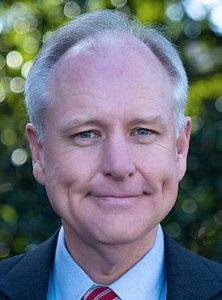Two hundred faith leaders, including some luminaries of progressive Christianity, have signed a new statement on Christian faith and democracy calling for renewed attention to eight key principles.
“The United States confronts a crisis of democracy, and the American church confronts a test of faith,” their statement says. “Democracy stands embattled, facing new threats within our nation and new challenges around the globe. The witness of ‘the faith once for all delivered to the saints’ (Jude 3) stands distorted and corrupted — especially to a new generation.”

Paul Baxley
Initial signers of the statement include Paul Baxley, executive coordinator of the Cooperative Baptist Fellowship, along with Randall Balmer, Walter Brueggemann, Anthea Butler, Diana Butler Bass, Tony Campolo, Eugene Cho, Shane Claiborne, Michael Curry, EJ Dionne, Kristin Kobes Du Mez, Nathan Empsall, David Gushee, Adam Hamilton, Brian McLaren, Otis Moss, Richard Mouw, Paul Raushenbush, Stephen Reeves, Jemar Tisby, Amanda Tyler, Miroslav Volf and Jim Wallis.
“In this time of pernicious polarization, we are forced to grapple anew with fundamental questions about governance, civic life, shared values and the role of faith in shaping our collective future,” the introduction continues. “The rise of anti-democratic sentiment and nationalist ideologies imperils our common life and threatens the cultivation of communal and global peace. As followers of Christ, we strive to meet this moment with clarity and courage, charity and conviction, drawing on the depths of our moral imaginations and theological traditions to articulate afresh a theology of democracy fit for our times.”
The letter affirms love of country and the “right of Christians to bring our faith to bear on the public square for the common good and the flourishing of all humanity.”
It warns that “in recent years, in the United States and around the world, the Christian faith has been distorted and leveraged in defense of authoritarian leaders who seek to erode freedoms essential to a thriving democracy. Some Christians enthusiastically praise dictatorial leaders and regimes. Some have willingly accepted or even participated in political violence.”
One evidence of that was the insurrection of January 6, 2021, the letter explains. “In a profound distortion of the faith, some who rioted on the Capitol steps and stormed into the congressional chamber did so in the name of Jesus Christ.”
The signers declare this to be “a kairos time,” meaning “a moment that can change time, altering events for decades, even generations to come.”
“This electoral season, each one of us must stand for democracy’s future.”
And it urges: “This electoral season, each one of us must stand for democracy’s future. We must resist cynicism, apathy and fear; withdrawing from the electoral process only risks consolidating power in the hands of those who would abuse it. We cannot transform democracy unless we save it.”
The letter affirms eight truths:
On the Imago Dei and human dignity: “Core to Christianity is the belief that all people are made in the image and likeness of God and that our loving God is incarnate in the humanity of Jesus Christ. God’s love, therefore, embraces all of humanity and calls us to respect every person. Democratic governance is an outgrowth of our divinely endowed dignity and corresponding obligation to protect the rights, freedom, and equality of all.”
On human sin: “Although humans bear the divine image, the capacity for sin runs through every human heart, and every nation. Christians are not immune from this reality. The mechanisms of democracy, the balances of power, and the protections of a Constitutional framework rein in human tendencies to dominate, demean and exploit.”
On truth and integrity: “We are called to speak truth, put away falsehood, and walk in integrity. … A healthy democracy rests upon a foundation of truth. For that reason, we must work to foster trust among citizens, to elect leaders with demonstrated integrity, and, with gratitude for the tens of thousands of election workers who labor to ensure that all voices are heard, to keep our elections safe, secure and fair.”
On loving the stranger and the enemy: “Jesus teaches us that loving God and loving neighbor are inseparable, and that loving our neighbors includes loving them and our enemies. We are obligated to reach out to those with whom we disagree, to empathize with those of different backgrounds and experiences, and to be hospitable to those who do not share our beliefs.”
On solidarity and the common good: “Love of neighbor calls for the inclusion of all our fellow neighbors in the political process. Democratic participation enables individuals to live in service to, and in solidarity with, one another — especially the marginalized among us. As Christians, we are called not merely to pursue self-interest, but to prioritize the collective good.”
“Too often, American Christians have been guilty of idolatry, of worshiping money and power rather than the one true God.”
On participation, wealth and poverty: “Too often, American Christians have been guilty of idolatry, of worshiping money and power rather than the one true God. All citizens, regardless of wealth or income, should be able to participate fully in shaping our life together. Money should not buy greater influence, and Christians should work to overcome all unjust exclusion from civic participation as commanded in the Bible by the God of justice.”
On religious pluralism: The gospel of Jesus Christ advances through divine grace and human persuasion, not by government power and coercion. A democracy respects and protects the freedom of the human conscience to discern and decide on matters of religious faith. Christian communities and democratic societies alike must recognize religious pluralism and uphold religious freedom, respecting both minority and majority religious beliefs.”
On peacemaking and bridge-building: “Rather than stir conflict and seed mistrust, Christians are to ‘live peaceably with all.’ In this spirit, Christians should collaborate with individuals and institutions — religious or secular — to work for the common good and for the realization of a more just world at peace.”
This letter promulgated by Christian progressives follows recent publication of a letter titled “Confession of Evangelical Conviction” signed by 375 pastors, scholars and other evangelical leaders from across the theological and political spectrum.
Both documents, in different ways, push back against the influence of conservative evangelicals and their support for Christian nationalism.
Related article:
‘Confession of Evangelical Conviction’ puts Jesus ahead of politics


